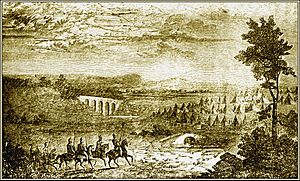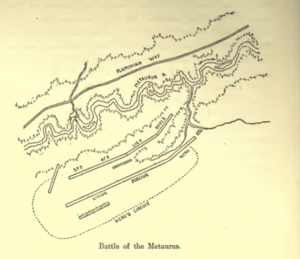Gaius Claudius Nero facts for kids
Quick facts for kids
Gaius Claudius Nero
|
|
|---|---|

Gaius Claudius Nero takes the head of Hasdrubal to the camp of Hannibal after the Battle of Metaurus, 207 BC.
|
|
| Consul of the Roman Republic | |
| In office 207 BC served with Marcus Livius Salinator |
|
| Preceded by | Marcus Claudius Marcellus and Titus Quinctius Crispinus |
| Succeeded by | Quintus Caecilius Metellus and Lucius Veturius Philo |
| Personal details | |
| Born | before 237 BC |
| Relations | Claudia gens |
| Military service | |
| Allegiance | Rome |
| Branch/service | Roman army |
| Battles/wars | Second Punic War:
|
Gaius Claudius Nero (born around 237 BC, died around 189 BC) was a brave Roman general. He played a key role in the Second Punic War. This was a huge conflict against Carthage, led by the famous general Hannibal Barca.
Gaius Claudius Nero started his military career as a legate (a high-ranking officer) in 214 BC. He later became a praetor (a Roman official) in 212 BC. In 207 BC, he reached the top position of consul, one of the two most powerful leaders in Rome.
He is most famous for his part in the Battle of the Metaurus. This battle was fought alongside his fellow consul, Marcus Livius Salinator. They faced Hannibal's brother, Hasdrubal. The Roman victory at Metaurus River in 207 BC was a major turning point in the war. Claudius Nero made a very bold move. He secretly left his main army, which was holding Hannibal in the south. He took a small group of soldiers north to help Livius's forces. This surprised Hasdrubal completely.
The Roman historian Livy called the Battle of the Metaurus the turning point of the war. It's even listed in a famous book called The Fifteen Decisive Battles of the World.
Contents
Early Life and Family
We don't know much about Gaius Claudius Nero's early life. He was likely born before 237 BC. He belonged to the gens Claudia, one of Rome's most important families. This family was known for being strong and brave. In the Sabine language, the name Nero meant "strong and valiant."
His family was related to later famous Roman emperors like Tiberius, Caligula, Claudius, and Nero. Over time, the Claudii family had many important roles in Rome. They held 28 consulships, 5 dictatorships, and 7 censorships. They also celebrated 6 triumphs (victory parades) and 2 ovations (smaller victory celebrations).
First Battle: Nola (214 BC)
The first time we hear about Claudius Nero is in 214 BC. He was an officer under Consul Marcus Claudius Marcellus at the Third Battle of Nola. This battle was in southern Italy. After Rome's big defeat at the Battle of Cannae in 216 BC, Hannibal tried to turn Rome's allies against them.
Hannibal tried to capture Nola three times. Each time, Marcellus defended the city successfully. In the third battle, Marcellus sent Claudius Nero with cavalry to attack Hannibal from behind. However, Claudius Nero either got lost or was too slow. He didn't arrive in time.
Even without his help, the Romans won the battle. They killed 2,000 Carthaginian soldiers. Marcellus was upset with Claudius Nero for not following the plan. Still, this battle was a good sign for Rome. Hannibal was pushed back and left the area.
Praetor and the Siege of Capua
In 212 BC, Claudius Nero became a praetor. This was an important step in his political career. He was put in charge of an army of about two legions (around 10,000 soldiers). His job was to help fight Hannibal in Southern Italy.
Siege of Capua (212 - 211 BC)
For a while, Roman armies had been fighting around the city of Capua. When Hannibal left the area, the Romans could focus on taking the city. Claudius Nero brought his army to Capua to help. The Roman forces, totaling about 40,000 men, surrounded the city. They built walls and blockhouses to cut it off.
Claudius Nero's term as praetor ended, but he stayed in command as a propraetor (a former praetor with continued military power). When Hannibal returned to try and break the siege, Claudius Nero led the cavalry. His army helped defeat Hannibal. Capua eventually fell to the Romans in 211 BC.
Service in Spain
After Capua was captured, Rome turned its attention to Spain. Rome needed a new general there because two important commanders had died. In late 211 BC, Claudius Nero was sent to Spain as a propraetor. He had an army of 6,000 Roman foot soldiers and 300 Roman cavalry. He also had Italian allies.
His main job was to reorganize the Roman troops in Spain. He also had to strengthen Rome's position against the growing Carthaginian presence. Claudius Nero joined forces with other Roman armies. He then advanced against Hasdrubal, Hannibal's brother.
Some stories say Claudius Nero trapped Hasdrubal. However, Hasdrubal supposedly escaped by pretending to negotiate while his men slipped away. Claudius Nero's time in Spain was short. In 210 BC, a younger general, Publius Cornelius Scipio, took over. Even so, Claudius Nero helped Rome by securing the coastal area north of the Ebro River. This gave Scipio a good starting point for his later victories in Spain.
Becoming a Consul
In 208 BC, both of Rome's consuls died in an ambush. This meant new elections were needed for 207 BC. Claudius Nero was seen as the best choice by the Roman Senate. This was because he had experience fighting Hasdrubal, who was now moving towards Italy from the north.
However, the Senate thought Claudius Nero was a bit too bold and aggressive. So, they decided to pair him with a "cool and careful colleague." This person was Marcus Livius Salinator. Interestingly, Livius and Claudius Nero didn't get along. Livius had been put on trial years before, and Claudius Nero had testified against him.
Despite their rivalry, these two men would soon lead Rome to one of its greatest victories.
The Battle of the Metaurus
The Battle of the Metaurus was a huge moment for Claudius Nero and for the Second Punic War. It was fought near the Metauro River in northern Italy. In 208 BC, two Roman consuls were killed in battle with Hannibal. This was a big loss for Rome. But in 207 BC, the Battle of the Metaurus changed everything.
How the Battle Unfolded
Hasdrubal was trying to meet up with his brother Hannibal in Italy. Roman legions led by Claudius Nero were following him. Hasdrubal sent messengers with his plans for the meeting point. But the Romans intercepted these messages! This gave them a huge advantage.
Claudius Nero was camped near Hannibal in the south. His fellow consul, Livius Salinator, was further north. Claudius Nero made a daring decision. He left most of his army to watch Hannibal. Then, he took about 6,000 foot soldiers and 1,000 cavalry and marched north. He joined Livius's army at night, surprising Hasdrubal. Hasdrubal realized there were two Roman consuls with a combined army. He decided to retreat to find Hannibal.
Claudius Nero and Livius pursued Hasdrubal. Hasdrubal's army got stuck on the south side of the Metaurus River because of flooding. During the battle, Claudius Nero was on the right side of the Roman army. He couldn't attack directly because of a deep ditch. So, he made an amazing move. He marched his troops *behind* the Roman lines. Then, he attacked Hasdrubal's forces from the rear, completely surprising them!
This was a disaster for the Carthaginians. Around 56,000 of their troops were killed.
The Battle's Importance
This battle was a massive Roman victory. Hasdrubal was defeated and killed. This was a huge blow to Hannibal and Carthage. After the battle, Claudius Nero ordered Hasdrubal's head to be thrown into Hannibal's camp.
Hannibal was devastated by this news. He reportedly said, "Now, at last, I see the destiny of Carthage plain." This meant he knew Carthage was doomed.
Claudius Nero's Bold Actions
Claudius Nero was in charge of the southern army, facing Hannibal. When he intercepted Hasdrubal's messages, he had to decide if they were real or a trick. He believed them. He then took a risk by taking a large part of his army to join Livius.
What Claudius Nero did was against Roman law. Consuls were not allowed to leave their assigned battlefront without permission from the Senate. But Claudius Nero believed that if he lost, nothing would matter anyway. If he won, he would be forgiven. His bold move and clever tactics, especially attacking from behind, led to the Roman victory.
The historian Polybius wrote that as soon as Claudius Nero attacked from the rear, the battle was no longer fair. Hasdrubal, despite being a great general, died fighting bravely.
After the Victory
When news of the victory reached Rome, people were overjoyed. The Senate declared three days of public thanksgiving. Claudius Nero and Livius Salinator shared a military triumph (a grand parade to celebrate a victory). Even though Claudius Nero's contribution was equal or even greater, he received a lesser honor called an ovation. This meant he rode into the city on a single horse, while Livius rode in a four-horse chariot.
Still, Claudius Nero was remembered for his glory in that war. The Romans captured a lot of treasure from the battle.
The Censorship
In 204 BC, Claudius Nero and Livius Salinator were elected as censors. This was a very high-ranking position. Censors had many duties, usually lasting 18 months. But Claudius Nero and Livius served for five years.
They counted Roman citizens, updated the list of senators, and managed public building projects. They also performed a special purification ceremony called the lustrum. During their time as censors, they chose Fabius Maximus as the leader of the Senate. They also removed seven senators from their positions for bad behavior.
They oversaw the building of new roads and temples. They also introduced a new salt tax, which was not very popular. The census took longer than usual because they had to count Roman citizens serving in the army overseas.
Unfortunately, their time as censors was marked by childish arguments between Claudius Nero and Livius. For example, they each tried to punish the other by ordering them to sell their public horse. They also tried to lower each other's social rank. These actions were seen as shameful. A Roman official tried to prosecute them for their behavior, but the Senate decided not to, to protect the dignity of the office.
Diplomatic Mission to Greece and Egypt
After Rome won the Second Punic War, they received a request for help from kingdoms in Greece. Philip V of Macedon was attacking Greek cities. In 201 BC, Rome sent a special group of three important Romans to travel to Greece, Syria, and Egypt. Claudius Nero was part of this group. He had a lot of experience in both diplomacy and war.
In Athens, they met with Greek leaders. They urged Philip to stop attacking Greek cities. Philip ignored their warnings and continued his attacks. In 200 BC, another Roman official delivered a final warning to Philip. This led to the Second Macedonian War.
Claudius Nero and the other envoys worked to get as many allies as possible for Rome in Greece. They also visited Ptolemy V in Egypt and Antiochus in the Seleucid Empire. Their visit to Egypt was to announce Rome's victory over Carthage and ensure their alliance continued. They also wanted to make sure these powerful kings would not interfere in the Aegean Sea.
Claudius Nero likely finished his mission by late 200 BC or early 199 BC. After this, he is not mentioned again in historical records, and it is believed he may have died.
See also
 In Spanish: Cayo Claudio Nerón para niños
In Spanish: Cayo Claudio Nerón para niños
Images for kids
 | Aurelia Browder |
 | Nannie Helen Burroughs |
 | Michelle Alexander |



